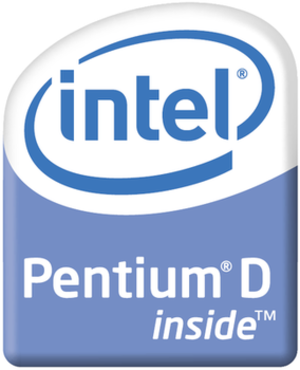| Pentium D logo as of 2006 |
The single core processor (the Pentium Series)is now just a memory(though i still use one).So lets start our comparison .

1.Advantages
Having a multicore CPU means that the processor can work on more than one problem at a time, or it can work on a large problem more efficiently if the program is built that way. Multitasking is easy to explain: If you're browsing the web, checking email constanly, and calculating the 20,000 cells in your latest spreadsheet all at the same time, having multiple cores means that core 1 can be working on the email, core 2 on the Flash webpage you're viewing, and cores 3 and 4 on the spreadsheet. When you have a single task that needs to be done right away, multiple cores can help you by breaking the task into smaller chunks, working on each chunk in parallel, and thus you'll get your work done quicker. An example of this is the 3D rendering of a still image. Most modern rendering programs can break the task into blocks, then parcel those blocks to each core as needed, and then the final image is put together at the end.
2.Clock Speed Or Cores
On the whole, a system with a faster dual-core will feel faster in day-to-day work, but the quad core will reward you when you multitask or the more esoteric/scientific your work. This is of course, a generality, but it generally fits. For example: The 3.1GHz Intel Core i3-2100 (dual-core) in the Gateway ZX6961-UB20P got a very good 2,639 point score at PCMark7 (a test of day-to-day use), but only a 2.99 point score at CineBench R11.5 (a 3D rendering test). Around the same time we tested a "slower" Intel Core 2.7GHz Core i5-2500S (quad-core) in a HP Compaq 8200 Elite USDT which got a much lower 2,190 score on PCMark7, but a much higher 4.45 point score on CineBench. The extra cache and cores in the i5-2500S helped the HP get a much higher score on the CineBench R11.5 test, where such enhancements benefit performance. In day-to-day tasks, both will seem similar, or at worse the HP will seem slower than the Gateway at an earlier stage in its useful life.
3.Verdict
You can (almost) always upgrade your memory or get speedier storage in the future when your computer starts to "feel slow" (and they all do after a while). More memory and speedy storage helps any PC feel faster because you spend less time waiting for stuff to happen. Upgrading to a faster processor isn't an option for most mortals, unless they are familiar with the pain of unhooking heat sinks and spreading thermal paste. : A system that is the fastest in its class when you buy it will continue to feel faster longer than a system that is merely adequate when you buy it. You want a quad-core processor if you're the type that likes to keep 150 browser tabs open while you check your IM, email, Twitter, and Facebook simultaneously, and then want to do photo editing work in Photoshop or play 3D intensive games on top of that. If all you're doing is puttering around the Web and don't expect anything strenuous from your PC aside from an emotional Angry Birds session, a dual-core processor is sufficient.
You have read this article Intel
with the title Quad Core Vs Dual Core CPUs. You can bookmark this page URL http://metroplexbbq.blogspot.com/2012/10/quad-core-vs-dual-core-cpus.html. Thanks!



No comment for "Quad Core Vs Dual Core CPUs"
Post a Comment